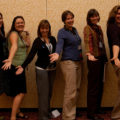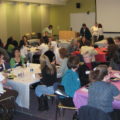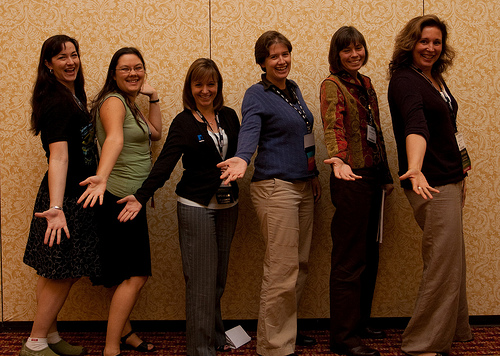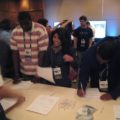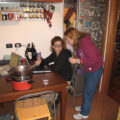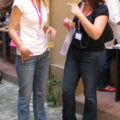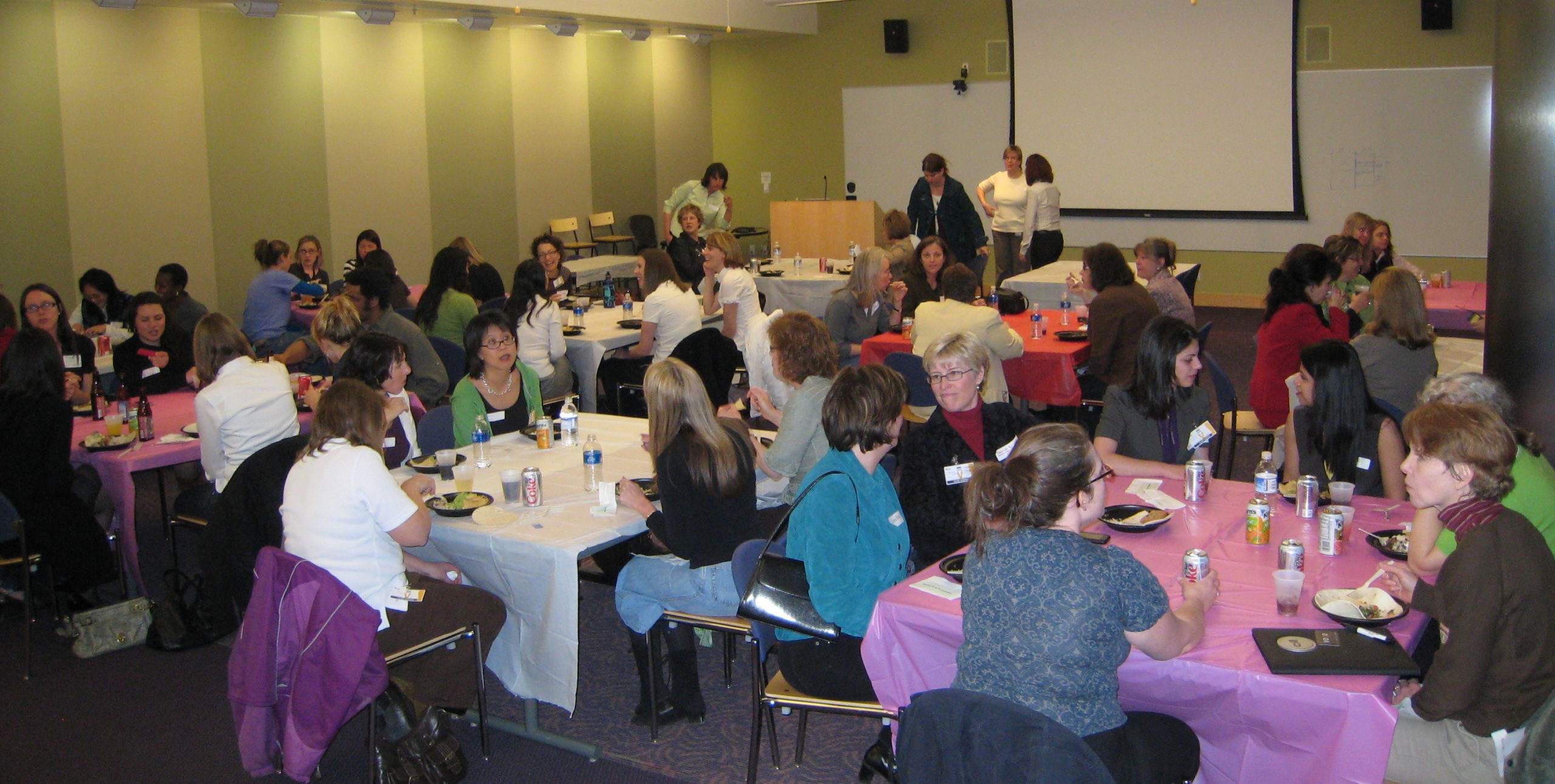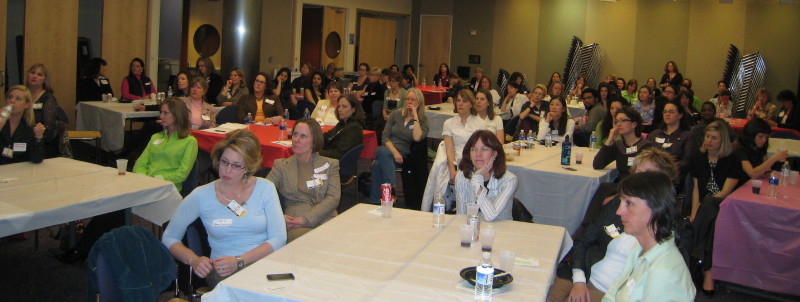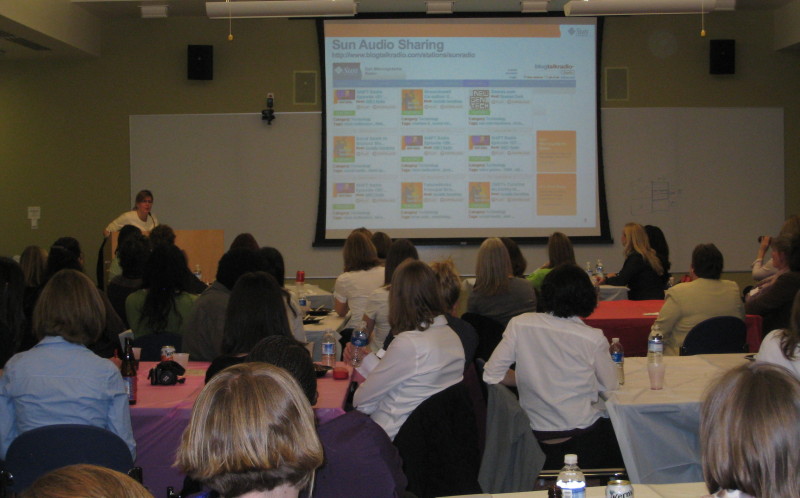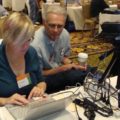Still trying to catch up with my notes from the talks I attended at the Grace Hopper Celebration of Women in Computing in October…
Jo Miller was a very popular presenter at GHC08, so was invited back this year to speak on Becoming a Person of Influence. Jo, an Aussie with a somewhat confused accent after years in California, does Women’s Leadership Coaching for a living, and I suspect from this experience of her that she’s good at it.
This talk had the particular merit of being useful to everyone attending, at whatever stage of their tech career.
I was amused that she started the session saying: “Anyone caught blogging or tweeting during the session will absolutely be invited back next year!”
From my notes:
The emerging leader’s quandary: you can’t get to the higher level job without leadership experience, but you can’t get the experience without the job.
How can you establish yourself as a leader while doing your current job?
Question: Are you the best-kept secret in your organization?
“In my company, influencing skills are the single most important success factor after knowing your job.” JoAnna Sohovich, Honeywell
Are power and influence good or bad? “Power is like manure: it really stinks if you keep it to yourself, but it’s good if you spread it around.”
Wanting to be an influencer means wanting to be a person who can make a greater difference than one person alone can.
An influencer arrives at the meeting early to greet everyone, and doesn’t wait for permission to speak when it’s her area of expertise. If you walk into a room with confidence and authority, people are predisposed to hear what you say.
Don’t think about influencing a specific situation but “how do I become a person of influence?”
First impressions count, but the cumulative impact of all impressions is more important.
The dog whisperer doesn’t train the dog – he/she actually trains the owner to exude an air of calm authority.
Our behavior teaches people how to treat us.
You can influence others in every conversation you have.
Jo asked people in the room to mention what they think of as leadership qualities. Responses included:
- know the people you’re working with, and care about them. People are not a means to an end, they ARE the end.
- be consistent and principled, good at engaging people in interesting conversations
- a leader makes you want to be a better leader
Countdown: The Six Sources of influence Available to Women Leaders
6. Positional influence: the influence inherent in your job title/role
For example, a woman was reorged into a situation where no one knew what she did, but her boss made a point of having her meet people.
“How are you introducing yourself?” You need an elevator pitch.
Building on positional influence:
you have an important job and people need to know about it
take every opportunity to educate others about the importance of your role and how you can help them
create a 30-second commercial:
1. name
2. title
3. I am responsible for…
4. come directly to me when you need…
You may need multiples “ads” to cover various aspects of your job.
Mine might include:
I’m Deirdré Straughan. I am responsible for helping people communicate about technology. Come directly to me when you need help/advice/training with social media, especially videoblogging and video streaming.
Or:
I am responsible for building and nurturing tech communities. Come directly to me when you need help with community strategy and execution.
One pitfall with positional influence is to over-rely on it and to imagine that, if you are higher up, influence comes naturally.
5. Expertise influence: background, qualifications, experience and expertise
Make sure you don’t let someone else take credit for your work!
Ways to build expertise influence:
- don’t wait for an invitation to speak up about your area of expertise
- promote your accomplishments
- present in meetings etc.
- write
- speak on panels, conferences
Pitfalls: “Are men smarter than women? No, but they sure think they are.” Women underestimate their own candlepower while men overestimate theirs (2008, Newsweek). Male job candidates are not shy to claim expertise they may not necessarily have! It’s not about paper qualifications, it’s about owning and making visible the achievements you already have.
4. Resources Influence:– the ability to attract and deploy resources you need to do your job well.
e.g. budget
Ways to increase resources influence:
- become a strong negotiator – know how to ask for and get what you need
- learn matrixed management
- cross-train others in your area
- gain visibility for the importance of your work and the effort it takes
- suggest special projects as developmental opportunities for others
3. Informational influence: being an informational powerhouse, who keeps finger on the pulse on business, personnel and organizational issues
Know the above, know who the other informational powerhouses are. Walk around and gossip, but filter useful info from noise. Seek out info about changes before they occur, e.g. new projects, opportunities, resource allocations, budget, long-range plans.
2. Direct influence aka coercive
Being firm,professional and direct when someone’s behavior is detrimental to team or org (1% rule) – when something really important is at stake. But also share a vision of what would be possible for them if they changed their behavior – show that you care.
Tips: be firm, fair, professional, direct and concise with tough news
explain what was unacceptable and why
focus on a positive vision for the future
1. Relationships influence: that which comes when you know who the key people are in your organization (and other areas of life), when you reach out to them and build authentic, trusting relationships and an influential network.
The most importnat thing you will build in your career is your network, aka your sphere of influence.
McKinsey leadership project – What drives and sustains successful female leaders? Connecting.
Think about:
Which sources of influence are you most strong in?
Which do you intend to strengthen?


